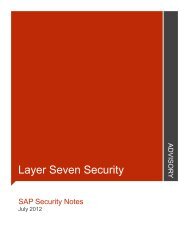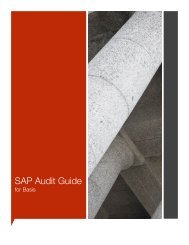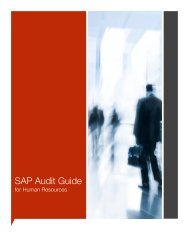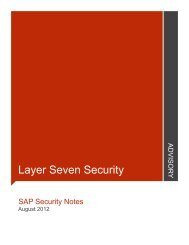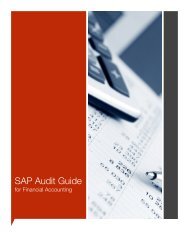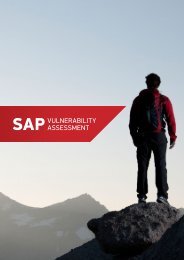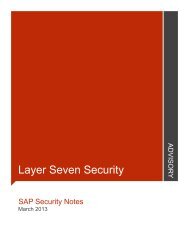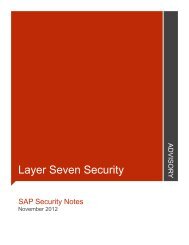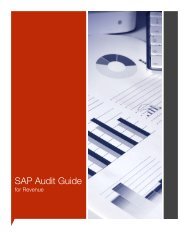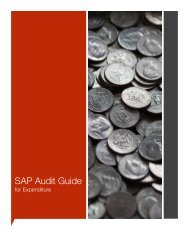DEFENSE IN DEPTH - Layer Seven Security
DEFENSE IN DEPTH - Layer Seven Security
DEFENSE IN DEPTH - Layer Seven Security
You also want an ePaper? Increase the reach of your titles
YUMPU automatically turns print PDFs into web optimized ePapers that Google loves.
<strong>DEFENSE</strong> <strong>IN</strong> <strong>DEPTH</strong> AN <strong>IN</strong>TEGRATED STRATEGY FOR SAP SECURITY 11the Enterprise Portal can support browser-checking to block connectionattempts from unsupported browsers.Microsoſt Internet Explorer offers the greatest protection for SAPaccess. The ability to configure trusted zones provides a seamlessuser experience while safeguarding against malicious applets, scriptsand downloadable content from untrusted sites. The use of Firefoxshould be avoided, wherever possible. Weaknesses in the existingarchitecture of the browser can enable vulnerabilities in add-ons to goundetected by anti-virus solutions.Web browser security should be supported with Web content filtering,anti-virus and anti-spyware, two-factor authentication for remoteaccess, as well as regular patching of browsers and operatingsystems. Personal firewalls can be enabled for added protection,including stateful inspection firewalls available in some Windowsoperating systems. However, firewall rules should be thoroughlytested to ensure they do not inadvertently block access to SAP andother business applications. Operating systems should be hardened inline with security recommendations issued by vendors or in accordancewith generally-accepted configuration benchmarks. ForWindows systems, hardening should include enabling file protection,strong password policies, account lockouts, roles-based access basedon least privilege, and disabling services such as FTP, Messenger,Remote Desktop Sharing and Telnet.LAYER SEVEN SECURITY<strong>Layer</strong> <strong>Seven</strong> <strong>Security</strong> specialize in SAP security. The companyserves customers worldwide to protect SAP systems againstinternal and external threats and comply with industry andstatutory reporting requirements. It fuses technical expertise withbusiness acumen to deliver unparalleled implementation,consulting & audit services targeted at managing risks in contemporarySAP systems.<strong>Layer</strong> <strong>Seven</strong> <strong>Security</strong> employs a distinctive approach to SAP riskmanagement that examines and manages vulnerabilities at theplatform, application, program and client level. Through partnershipswith leading soſtware developers, the company is able todevelop SAP systems with defense in depth and performintegrated security assessments that improve the quality andlower the cost of SAP audits. <strong>Layer</strong> <strong>Seven</strong> <strong>Security</strong> leverageleading SAP-certified solutions to provide comprehensive andrapid results covering risks in every component of SAPlandscapes.www.layersevensecurity.comBasic authentication should be avoided for HTTP connections since itdoes not sufficiently protect user credentials during transport betweenclients and SAP servers. Also, it is susceptible to phishing attackssince servers are not authenticated. Phishing involves the redirectionof users to malicious servers with logon screens that appear identicalto those of legitimate SAP servers. User credentials entered intomalicious servers can be used to compromise SAP systems. As aresult, SAP strongly recommends the use of SSL/ HTTPS to securebasic authentication. This encrypts client-server communication andauthenticates SAP servers. SSL requires the configuration of digitalcertificates which can be obtained from SAP Trust Center Services.SSL also protects SAP logon tickets used for single sign-on. Theseare authentication tickets stored as non-persistent cookies inbrowsers. However, this does not include safeguards againstcross-site scripting attacks that attempt to read cookies through theexecution of client-side scripts. This requires alternativecounter-measures including the configuration of cookies asHTTP-only. The parameter setting ume.logon.httponlycookie=true willprevent malicious attempts to read SAP logon tickets.LAYER SEVEN SECURITY © 2013



